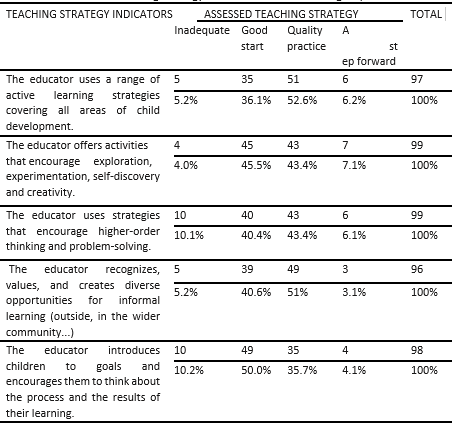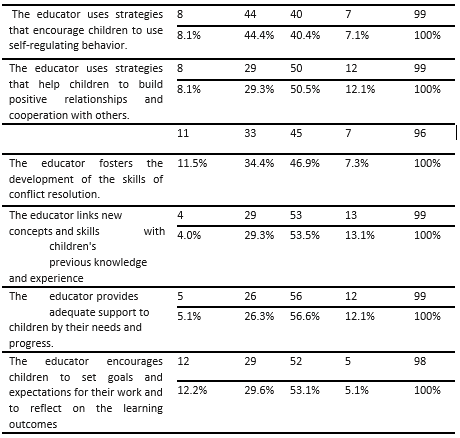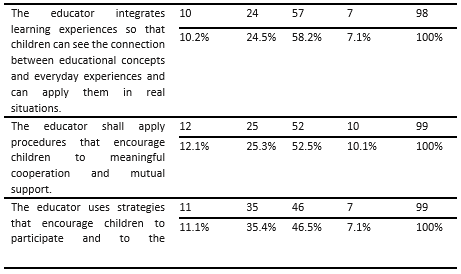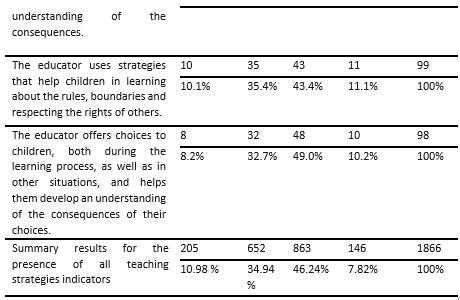Article
Teaching Strategies in the Preschool System of Montenegro
Veselin Mićanović[1]
Tatjana Novović[2]
Department of Pedagogy, University of Montenegro
ABSTRACT
Preschool education in Montenegro is undergoing a process of significant change, especially in the last two decades. The seriousness of this educational segment within the whole educational continuum corresponded with equally serious education policy solutions. The way of working with children of preschool age largely affects their development, level of autonomy and motivation for achieving educational goals through active learning and participation. When it comes to the Montenegrin education system, this particular educational segment is becoming even more visible with the intention of faster, more comprehensive and effective development in perspective. Therefore, active learning through the process of a full children's participation and voluntary choice is the basis of the leading preschool education paradigm in the contemporary educational context.
This study aims to establish the dominant form of child-centred learning in kindergarten, on a sample of 475 children surveyed directly in various educational groups. The research results indicate that Montenegrin kindergartens foster different models of learning and encouraging children's initiatives, with the participatory approach dominating the work of a child.
Keywords:
Kindergarten; Child; Educator; Active Learning
INTRODUCTION
Scientific, professional and public awareness of the importance of early childhood development as the fundamental stage of the whole eco-systemic progression of each individual, as J. Bronfenbrenner emphasises in its theoretical-scientific paradigm of individual growth, matures focusing on the search for concrete and functional strategies of reaffirming this segment. Scientific indicators in the field of neuroscience, developmental psychology, pre-school pedagogy and other disciplines, which discuss this issue from the various scientific and theoretical aspects, undoubtedly lead to significant multi-aspectual, early childhood development capacities, which deserve full attention and sensitive attitude of adults, all those who are directly and indirectly responsible for and involved in the process of support and stimulation of children's progress. Exposure to high-quality developmentally supportive complex educational incentives during the early years leads to better overall development outcomes, according to numerous studies (Bennett, 2001; Shonkoff and Phillips, 2000; Leseman, 2002, 2009; New and Cochran, 2007; Mitchell et al., 2008). The concept of the child is an image or a construct that is being formed in professional and everyday discourses (Bašić, 2011).
One of the paper’s research points, which we considered a complex and important segment, especially within a child-centred educational concept aimed at children, is to promote the active/participatory approach. Therefore, we differentiated between various aspects of the participation of the child in the overall interaction and the living tissue of the kindergarten community. What does this concept contain? Does participation involve organised permanent work and learning in highly structured circumstances, or does it entail control and monitoring? Participation, understood as a complex, comprehensive involvement in the whole process of learning, work, and life in kindergarten and other liferelated contexts of children's development predominantly takes place through the game as the most natural of all children's activities. The perception of preschoolers still inelastic, and imperfect nerve control movements and small muscles of the hand, makes the process of adoption of graphomotor skills even more complicated (Vygotsky, 1983). The development of fine motor coordination is directly associated with the degree of CNS maturation and development of speech (Antropova & Koljcova, 1983). Based on Piaget's theory, French researchers from the CRESAS centre are developing a socio-interactionist conception of learning, according to which the knowledge is the internal processing of experience, while learning is the active building of knowledge and perfecting of thinking (Miškeljin, 2008).
Woodhead outlines three important issues arising from the contextual concept of childhood: (a) differences in early childhood; (b) development as a social and cultural process; (c) early childhood as a social construct (Woodhead, 2012). Development potentials of childhood are undoubtedly extremely powerful, but one should not abstract the fact that the differences among children are also natural and unique invariant, and therefore full support to the overall development of every individual rests on several key, fundamental principles: respect for the development of universals, but also the uniqueness/specificity of the child or the individualization of educational methods, holistic approach; partner and teamwork engaging all the actors in child development and learning, active/participatory, interactive/constructive relation to the environment, knowledge and learning; respect for family determinants and diversity of the contextual specifics of the environment in which the child grows.
Research Methodology
The scope and aim of the research
The research aims at understanding the predominating concept of the active/participatory approach in working with children in kindergarten. The main problem of our research in this paper is to determine the current situation regarding the adequate application of the active /participatory approach to work. In the course of the research, we used surveys and observational analysis procedure, and for this particular purpose, we applied an adapted scale of assessment of the quality of work in preschool institutions (ISSA instrument) to get an objective idea of the real situation regarding a focused problem. The aim was to collect as much relevant information about the current situation in preschool institutions as possible, using the model of the high level of child initiatives, focusing on children and their active, full participation in the process of development and learning.
Sample
The sample included 475 educational units in three Montenegrin regions (southern, central and northern), while the assessment of teaching strategies was done on a sample of 99 units.
Organisation of research and showing results
Authors of the paper personally conducted the research. Observation of activities was performed, at the same time, by two researchers who independently monitored activities and identified indicators from the observation protocol, and afterwards analysed impressions about the activities and determined the prevalence of specific indicators.
This paper presents the frequencies and percentages, as well as statistical indicators of variables, based on which it is possible to observe models of good practice. Quantitative indicators complement the descriptive analysis of the problem.
Results of the research
For consideration of the level and quality of the presence of one of the critical components of the reformed preschool system - active learning through play and full participation of children in educational activities, the educators were polled about the key issues operationalised through several individual items. Respondents used a four-level scale to express their assessment of the level of representation of a concept.

Table 1. Affirmation of active learning in children
As it can be seen from the table with frequencies and percentages, our respondents (educators) from all three regions estimate that encouraging active learning in children (through participation) in preschool institutions is present with high percentage: Southern region: 31.7% (completely achieved) and 68.3% (mainly achieved); Central region- 99.1 (completely and mainly achieved); Northern region - 45.0% (completely achieved) and 55.0% (mainly achieved). Truth to be told, choosing the second option may indicate a certain reserve and caution in considering the level and quality of implementation of this important concept in practice.
Thus, higher value in assessments and choices of our respondents indicate that, in practice, the children are offered more space for the affirmation of active learning through play. Educators leave more and more room for independent action and decision-making while respecting others, and there is generally less insistence on the "blind" and uncritical obedience of a child, and heteronomous consistency in carrying out the given instructions. Affirmation of children's autonomy is based on the development of independence in thinking and behaviour, initiative and self-regulation (Mlinarević & Thomas, 2010).
"Children should be allowed to investigate whenever possible independently. These skills are more durable and better, learn from each other, since they tend to be more satisfied... ", says one of the interviewed educators from Podgorica (Central region). Allowing them to choose various contents, involving children and adults in the creation and design activities, encouraging the development of the child's autonomy, building identity, self-esteem, self-confidence and self-realisation. It is, therefore, necessary to activate the child through activities in which they explore, discover, build and reconsider their "theories" and meanings, building their own internalised concepts and terms, with a rich and varied offer of appropriate materials and situations for learning (Slunjski, 2012).
The holistic approach allows natural linking of an internal and external constituent component of the educational environment. The selection of content learning through play is based on understanding and respect for children's perspective of thinking, ways of understanding, etc... According to the interviewed educators, current practice promotes integrated learning through play because the child "learns by responding with their whole being" (Miškeljin, 2006).
In support of the above comment by an educator, the interview responses show that educators try to link the life-practical activities with various fields and areas, thus enabling children to use the language, communication, cognitive and socio-emotional skills through a variety of game-related activities. After the phase of external, more associative linking of different objectives and contents from certain fields/domains of learning, educators today understand and apply specifically integrated curriculum in practice, seeking deeper connections between certain areas through the development of key terms and concepts.
Judging by the responses received, respondents estimate that the educational practice has undergone significant changes and that the children in today’s preschool institutions have the opportunity to participate in educational activities actively, according to their possibilities and needs, and to follow their interests, as well as coordinate with others, peers and adults. From the interviews themselves, we can conclude that this is significantly contributed by a more flexible spatial and temporal organisation of life in kindergartens, centres of interest, given the diversity of materials, and a more open attitude towards parents and the wider environment. They find that children develop their skills better in this environment, that they are more independent, more open, more active, more cooperative, and know how to share duties and responsibilities, fostering open communication with peers and adults. Design of the work activities is based on careful observation, listening to children and documenting their needs. This mode of work aims at the full development of a child concerning their subjectivity and individual characteristics.

Table 2. Educators encourage children to recognise other people’s feelings and to react to them properly
Through role play, conversations with children, organising joint activities in centres of interest and outdoors, educators encourage children to build empathy, to understand the difference and diversity, and to naturally accept different perspectives and be more patient with contrasting views and gradually leave their "self-centred perspective."

Table 3. Educators encourage children to propose solutions to problems, to ask for help from adults if they need it
One of the indicators of stimulating active learning/participation of children in the educational process is encouraging children to solve problems. Our respondents claim that educators in Montenegrin pre-school institutions, strengthen these abilities in children, very often (55.0%) and often 41.8%. Participating in collaborative, team activities, and centres of interest, children can coordinate their perspectives with others, to be tolerant of different needs and opinions. Also, they are able to go beyond their conflicts, solve problems, share with others, delay their reactions, wait for their turn, to "save their place" in the peer community, thus improving own socio-emotional and other competencies.
Intentional, planned affirmation of the problem method in the educational process contributes to the development of children's learning through discovery which occurs during the play. An open system of work in pre-school institution helps the child to follow their needs and interests, with non-directive motivating suggestions of educators, and to work on the resolution of problem situations in an appropriate environment. Respecting children's ways of resolving problem situations, stimulates children to discover, try, make assumptions, comparisons, evaluations and plan new actions.

Figure 1. Independent information finding
One of the ways to have children actively participate and learn is encouraging them to seek further information on certain topics and events. Play activities lead to the formation of new mental structures, so the game becomes an imaginative symbolic activity of the individual and their rational reaction in the exploration of the environment (KopasVukašinović, 2006). The child is trying to represent their experiences, ideas, relationships using symbols during the play (Duran, 2001). According to the estimates of our respondents, 97.2% of educators do this very often and/or often by encouraging children to learn more about a topic from their parents, children's books/encyclopedias, in from other sources with the help of peers and adults, they invite adults to visit the kindergarten and learn together about the subject/ phenomenon in question. Children do this gladly; they feel respected, responsible, helpful and very motivated to participate. For systematic, comprehensive and continuous development of child-friendly interesting topics and concepts, it would be desirable to work on the planning and design of small projects, in which children, educators, parents and other adults in the community could take part. For now, planning for projects happens very rarely in preschool institutions in Montenegro.

Table 4. Educators encourage children to ask questions
To develop children's autonomy, their understanding of a different opinion, the original way of learning and fostering natural curiosity of children and their need for asking questions is necessary to affirm learning through discovery, seeking new meanings, and creating new cognitive entities. Children seek answers, confront with their views, explain, argue in their way, trying to understand and clarify the problem. Our respondents estimate that children are very often and often (Table 4) encouraged to ask questions and search for new ways of learning and knowing.

Table 5. Educators encourage children to show perseverance in solving tasks.
Respondents estimate that one of the important benefits for children attending kindergarten is to stabilise their attention, exercise patience and persistence in addressing specific individual and/or team/group tasks. In that sense, educators, with the creation of interesting and diverse playing activities, encourage children to persist in completing started "tasks", to be motivated and committed to work and to participate in joint activities (Table
5).

Table 6. Educators motivate children to apply the knowledge in new situations.
Our respondents estimate that strengthening the ability to apply knowledge in practice is in focus much more than it used to be, so instead of memorizing the content (songs, stories, counting…) children are encouraged to develop communication skills, cooperation, application of cognitive processes, and social skills for living in a community. Opportunities for situational learning allow children to perform a variety of practical and complex activities, and to apply and integrate of acquired knowledge and skills. From the table above, educators very often and often (95%), encourage children to apply their knowledge in new situations. Educators encourage children to exercise and build mathematical and logical skills and performance through the application of different operations: comparing, sequencing, or classifying objects.

Figure 2. Comparing cause and effect

Figure 3. Classifying objects
These graphs show the extent to which educators are working on building the capacities of the child comparing the causes and effects of different activities, as well as the skills of classifying objects according to certain criteria.

Figure 4. Building games
All preschool educators allow children to participate in building games and the working environment of educational groups is always open and equipped with building centres of interest. The problem may pose a large number of children and limited spatial resources for unrestricted movement and exercise of locomotor skills.

Figure 5. Music games
The idea of social constructionism is a fundamental starting point in the concept of psychosocial observation of childhood, from which stems a very complex image of the development nucleus anchored to the systemic spiral of social changes (Vranješević, 2008). In preschool institutions, considerable attention is paid to children's plays, dramatisation and role play centres are generally always open. Also, inevitably and continuously, music activities are spontaneous and/or planned and represented the background for all events in kindergarten, both for impromptu and specifically designed and purposeful activities.

Figure 6. Group work
All forms of work are being utilized in all kindergartens — frontal and group work, in particular. Rarely, as assessed by our respondents, we come across working in pairs, (affirmative response - 38.3%). Educators, using directing children to participate in group and pair work activities, promote cooperative learning, agreeing on ways of solving problems, compliance of perspectives and skills of social exchange.





Table 7. Presence of teaching strategy indicators in educational groups
The prerequisite for successful teaching is to continuously encourage the child to participate in activities, the use of cognitive processes, to think and find solutions in problem situations. Therefore, the development of focusing and attention in children is a very important prerequisite for patient and persistent combining, researching, and problemsolving. In observation of practical activities in educational work at different age levels, we used 19 indicators in the category strategies of teaching/learning (Table 7). A wide range of indicators for of teaching/learning strategies arise from the need to objectively examine the educator in a group activity, the use of different approaches to teaching/learning, in which the child has a central position. It is about teaching strategies that encourage: all areas of child development; research, experimentation, self-discovery and creativity; higher-order thinking and problem solving; informal learning; reflecting on the process and the results of their own learning, use of available, developmentally appropriate technologies; fostering a sense of their own uniqueness and identity; children's autonomy and initiative; selfcontrolled behavior; building positive relationships and cooperation with others; conflict resolution skills; connecting new concepts and skills with previous experience; learning support tailored to individual needs; planning realistically achievable goals, and critically evaluating the learned content; connecting different educational contents and activities appropriate to real life; fostering cooperation and mutual support in the work; understanding of the consequences of their own actions; understanding the rules, boundaries and rights of others; choosing various activities and understanding the consequences of one’s own choices.
The total score obtained by reviewing each indicator of teaching strategies is dominated by the quality practice option (46.24%), followed by good start (34.94%), inadequate (10.98%) and finally a step forward (7.82%). The results show that educators understand and use modern teaching strategies, to a considerable extent, but, as with the previous indicators, we cannot abstract the striking indication (34.94%), which indicates the only good start or a path to a quality practice, with even 10% of responses marking inadequate. This is evident in all the indicators of quality of application of teaching strategies (Mićanović & Novović, 2015).
The reasons for such findings and indicators can be found in the above-mentioned challenges in practice: big groups, inadequate physical conditions and resources for the work, and to some extent, lack of modern professional competencies of educators for functional, comprehensive implementation of complex teaching strategies, and insufficient motivation for deeper, systemic and comprehensive change of practice in the direction of more committed participation of all stakeholders.
Conclusions
The research conducted in preschool institutions in Montenegro was focused on a comprehensive understanding of the key constituent components of the overall institutional context in which children of preschool age "live" their needs. We were particularly focused on the area of methodological strategies used by educators in pre-school groups, with the aim of reviewing the level, quality and type of children’s active, participatory learning and participation in a variety of child-centred play activities. Based on the survey results, these observational findings, supported by claims gathered through short individual interviews with educators, whose activities we observed and analysed, we can conclude that the practice of preschool institutions in Montenegro, to a large extent is child-centred and tailored. Dominantly, results from observational rating scales mark the third level of realisation of tested teaching/learning strategies: the level of quality practice. Thus, the paradigm of the high level of child initiative, understanding, active learning, full participation in the preschool context has its clear expression and embodiment.
REFERÊNCIAS
Antropova, M.V., Koljcova, M.M. (1983). Psihofiziološka zrelost dece. Beograd: Zavod za udžbenike i nastavna sredstva
Bašić, S. (2011). (Nova) slika djeteta u pedagogiji djetinjstva, u Nove paradigme ranoga odgoja, Zagreb: Filozofski fakultet Sveučilišta u Zagrebu, Zavod za pedagogiju
Bennett, M. J. (2001). Developing intercultural competence for global leadership. U: Reineke, R. D., Fußinger, C. (Eds), Interkulturelles Management: Konzeption – Beratung – Training. Wiesbaden: Gabler, str. 205-226.
Bronfenbrenner, U. (1974). Is Early Intervention Effective? Washington: Department of Health, Education and Welfare.
Bronfenbrenner, U. (1979). The Ecology of Human Development. Experiments by Nature and design. Harvard University Press. Cambridge. Mass.
Duran, M. (2001). Dijete i igra, Zagreb: Naklada Slap
Kopas-Vukašinović, E. (2006). Uloga igre u razvoju dece predškolskog i mlađeg školskog uzrasta. Beograd: Zbornik Instituta za pedagoška istraživanja, 38
Mićanović, V.& Novović, T. (2015). Dimensions of Preschool Education Environment in Montenegro. Croatian Journal of Education, Zagreb: Faculty of Teacher Education University of Zagreb.
Miškeljin, L. (2008). Otvoreni kurikulum dečjeg vrtića. Predškolsko vaspitanje, Kikinda
Mlinarević, V., Tomas, S. (2010). Partnerstvo roditelja i odgojitelja – čimbenik razvoja socijalne kompetencije djeteta. Osijek: Učiteljski fakultet
Slunjski, E. (2012). Tragovima dječjih stopa. Zagreb: Profil
Krnjaja, Ž., Miškeljin, L. (2006). Od učenja ka podučavanju. Beograd. Laćarak, AM Graphic
Vigotski, L. (1983). Mišljenje i govor. Beograd: Nolit
Vranješević, J. (2008). Razvojne kompetencije kao osnova prava deteta na participaciju, doktorska disertacija, Filozofski fakultet, Beograd
Vudhed, M. (2012). Različite perspektive o ranom detinjstvu: teorija, istraživanje i politika. Beograd: Institut za pedagogiju i andragogiju Filozofskog fakulteta
[1] E-mail: vele-nk@t-com.me
[2] E-mail: tabo@t-com.me


